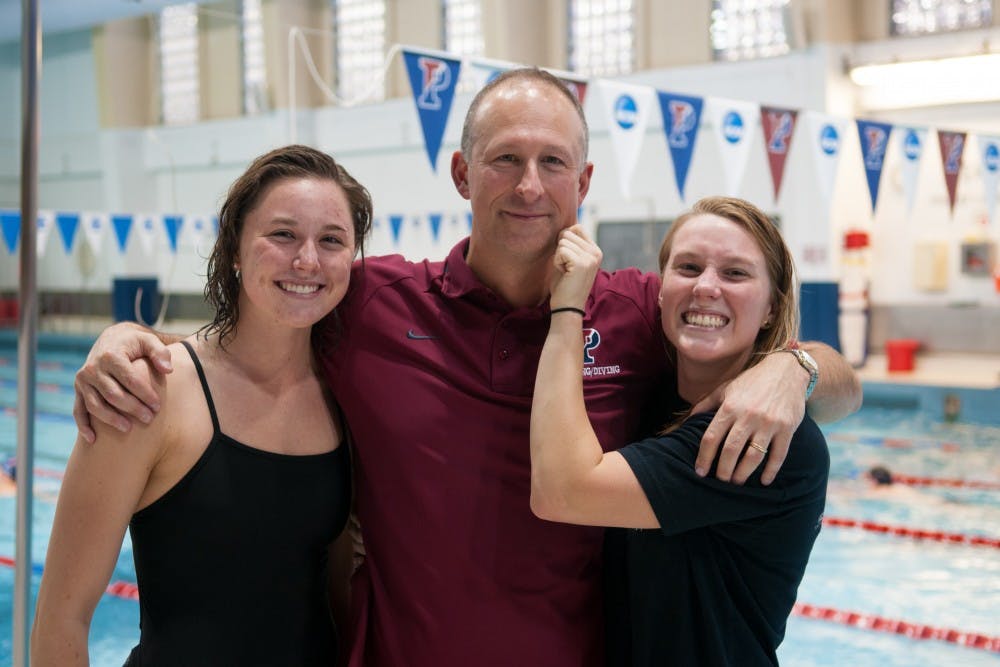The men and women of Penn swimming and diving enter their season with a strong sense of accomplishment. They are, after all, a year removed from a historically successful season that included the second highest point total ever recorded by the women’s team at the Ivy championships, a combined seven conference titles, and the first NCAA champion in program history.
While the glow of last year’s victories might never dim, the team’s current prospects do not look as promising. The graduation of Chris Swanson, the best 1,650-yard swimmer in the country, and his sprinter compatriot Eric Schultz leave big holes at the top of the roster. The two, particularly Swanson, were rare performers whose talent and leadership will be missed.
The future is nevertheless bright for the Quakers, as many freshman who contributed a year ago will have yet another year to fine-tune their technique. Sophomore Mark Andrew was impressive in his rookie season as, along with qualifying for four events at the NCAA championships, he set an Ivy record en route to a championship win in the 400-yard Individual Medley. Fellow second-year swimmer Thomas Dillinger also put up fast times in IM races at the Ivy championships and played a crucial role throughout the season as part of Penn’s NCAA-qualifying 400-yard freestyle relay.
Coach Mike Schnur insists, however, that these young individual standouts are not yet expected to fill the shoes of his departed graduates.
“They’re much more about their development. Our leadership roles are all about our juniors and seniors,” Schnur said. “We have a big senior class and they’ve hopefully been paying a lot of attention the past two years. They all lead in their own way and they’re all different swimmers.
“You have Grant Proctor as the leader of the backstroke. You have Kevin Su as the leader of the 200 freestyle group. There’s Michael Wen as our butterfly leader. So all of those guys assume those rolls within the groups they train with and when we get to meets, we rely on them to win those races.”
On the women’s side, the loss of talent is significantly less drastic, as the team has returned the vast majority of their top performers. Senior Rochelle Dong, fresh off of setting record times in several freestyle races, is poised to cap her stellar individual career by capturing her first Ivy title. Captain Ellie Grimes, in her last year, will look to lower her school-record setting marks in the 200-yard individual medley, 400 IM and 200-yard breaststroke. And junior Virginia Burns, the team’s most decorated swimmer, will try to collect her third consecutive Ivy championship in the 500-yard free.
It is clear that the individualized nature of the sport allows for a variety of swimmers to step up into crucial leadership roles. But all the upperclassmen agree that their mentorship of the younger teammates will factor prominently in their adjustment to collegiate athletics.
“The past three years have given us an opportunity to swim and train with people like Chris Swanson and Eric Schultz. So it’s up to us to pass on what we learned to the younger guys,” Su said. “A lot of [adjustment] is honestly balancing the academics and athletic parts of college life. Also a lot of these younger kids haven’t really done weights, when they were in high school so that’s a new thing for a lot of them.”
“There’s only two seniors on the sprint side of the team. I’ve taken up a role to teach the freshmen the how-to’s of the sprint group,” Dong said.
“One of the biggest things is that we all come from different training backgrounds. One of the freshmen, Emily Layne, on the team has never swam morning practice. A big struggle when you get to college is figuring out how to balance both morning practice, afternoon practice, weights, and classes. I’ve been trying my best to help them get situated and manage all the stress. We want to prioritize athletics, but we want to make sure that they’re also academically on point.”









